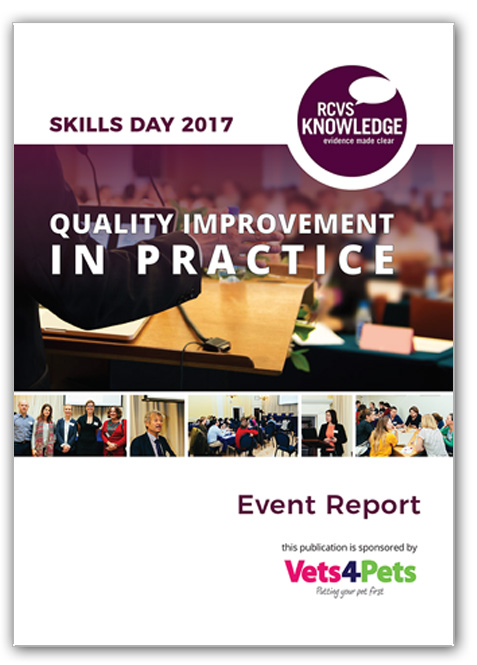Our commitment to QI
We support veterinary practices to continually improve the care they provide.
Our research has shown that 96% of the professions (including veterinary surgeons, nurses and managers) believe that continuous Quality Improvement (QI) will improve veterinary care.
However, while there is a broadly positive orientation towards QI, there is much less clarity about what it involves in practice. As identified in our report conducted with research institute RAND Europe, those new to QI are unclear about the best ways to get involved, and many want manageable steps and signposting to help them on their way.
Our support for the veterinary professions focuses on providing the resources and guidance for practice-based teams to embed formal approaches to QI.
We know that a lack of time, know-how and organisational support are the three leading barriers to QI uptake among practice teams. We champion techniques that, when conducted in a cycle, can provide an efficient structure for an evidence-based approach to animal care.
Our vision
Our vision is for full-cycle, continuous QI to be embedded in day-to-day work across the sector, with improvement activities formalised, recorded, and monitored to measure their impact, with the resulting evidence shared profession-wide.
We believe that QI should be part of normal working, rather than an add-on to the day job. We support a one-team approach, focusing on how the veterinary sector can successfully work together and interact.
Our aim is to lead harmonised approaches to QI that emphasise collaboration and shared learning to advance the delivery of quality care.
Our work
2017
We formed the Quality Improvement Advisory Board, selecting members based on their experience, expertise in or engagement with the subject matter, their reach, or if they represent the professions. They advise on our strategic direction, provide clinical oversight and champion the commitment.
We ran a Skills Day, opened the annual Knowledge Awards and produced multimedia content such as podcasts and videos, blog posts on our dedicated blog page, and social media campaigns. A further series of blogs on patient safety and clinical human factors have been developed, looking at the principles and associated themes of Quality Improvement.
2018
We launched our suite of free practical tools, including walkthroughs, templates, courses and case studies for the five key QI techniques:
- clinical audit
- benchmarking
- significant event audit
- guidelines
- checklists.
Our resources allow busy veterinary teams to consider the best available evidence during day-to-day practice, in a manner that supplements and supports clinical decision-making.
2019
We commissioned a major research project to identify the needs of the professions, in order for them to implement systematic, continuous QI in day-to-day practice. The study identified a series of key recommendations for achieving full-cycle QI implementation, culminating in our six-point roadmap for the industry.
We hosted the inaugural National Summit for Supporting Quality Improvement in Veterinary Care, bringing together key policy-makers and influencers across the industry.
We launched our roadshows programme, offering focused and practical QI support that can be embedded immediately into day-to-day activities. Our quality improvement events run throughout the year – full details of our upcoming events and roadshows can be found here.
2020 and beyond
Our 2020-2022 strategic plan responds to the recommendations of the research report. The document outlines our plans to engage the wider veterinary community in the concepts and delivery of QI, driving a cultural change that is open to the prospect of analysis, change and, ultimately, improvement.
Take part
We work with several organisations and individuals. There are many ways you can join the commitment to QI – this can be either by doing your bit in practice or by working with us directly. However you choose to get involved, we’d love to hear from you.
To keep updated on new resources, events, developments and stories, sign up to our newsletter.
